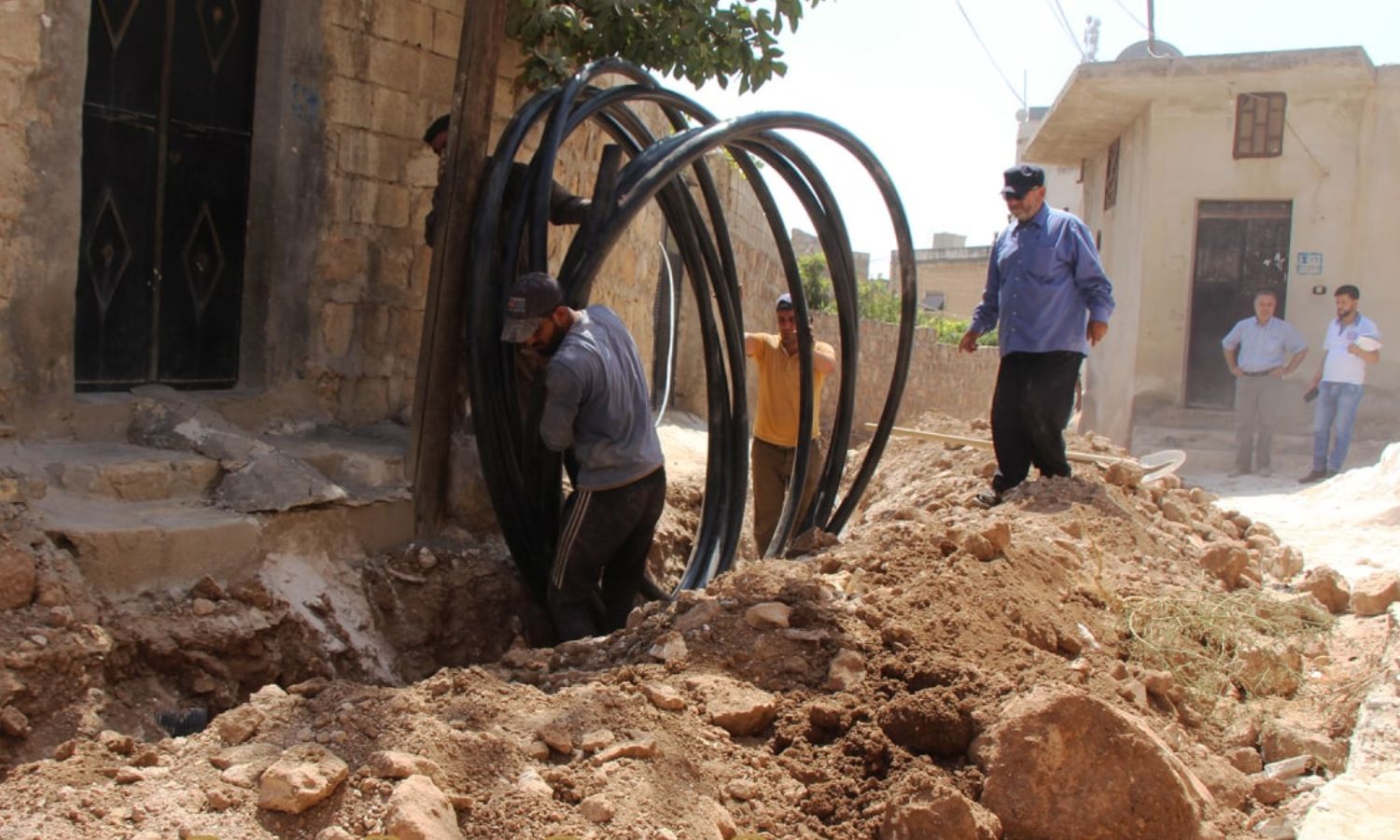



Idlib – Anas al-Khouli
The water networks in Idlib province are suffering from significant damage, which prevents reliance on them for pumping drinking water to the villages and cities of Idlib. Additionally, these networks are primarily based on pipes made of asbestos, which contains extremely dangerous carcinogenic materials to human life.
Water networks were extended in the province of Idlib in 1980, and asbestos pipes were used in expanding most of the network due to their pressure resistance and their long expected lifespan, which reaches up to 50 years, according to well-informed engineers who spoke to Enab Baladi.
The problem of the lines is added to the problems experienced by the drinking water reality in Idlib and its areas. The water pumping to the city was halted for 15 days at the beginning of this year but resumed after the city’s neighborhoods witnessed a crisis and an increased demand for water tankers, with owners exploiting the crisis and raising prices.
Engineer Mohammad Jamal Deeban, Deputy Director of the Public Corporation for Drinking Water in Idlib, told Enab Baladi that nearly all water networks in Idlib province rely on asbestos pipes, and work with them was stopped after linking the use of asbestos with an increased risk of cancer.
He explained that the Public Corporation for Drinking Water in Idlib is facing challenges, at the forefront of which is pumping drinking water to citizens in cities and the countryside, and replacing dangerous and dilapidated water networks.
According to Deeban, the corporation has placed plans to change pipes that threaten citizens’ lives as a top priority. However, the needs are significant, leading the corporation to address entities working in the humanitarian field and ask for assistance in replacing the networks.
Deeban mentioned that the corporation had finished replacing all asbestos pipes in Idlib city, and the priority now is to replace many of the main drinking water lines, including a four-kilometer line that reaches Idlib city, a 3.5-kilometer line connecting the town of Mastouma with Idlib city, a 6.3-kilometer water line between Armanaz and Mals, and water lines and networks in Jabal al-Summaq.
The engineer pointed out that the newly used pipes for installing drinking water networks are made of polyethylene, due to their high flexibility, weather tolerance, and chemical and thermal resistance, amidst hopes that humanitarian organizations will respond to participate in replacing the existing asbestos pipes in the region.
This material consists of a group of fibrous minerals extracted from special mines, and silicates are included in its composition. It was previously used in the production of drinking water and sewage pipes for its high resistance to pressure and heat.
All types of asbestos represent dangerous carcinogenic materials to humans, according to the World Health Organization (WHO), which warned against exposure to this material in any form, indicating that 125 million people around the world are exposed to asbestos at their workplaces.
Estimates by the World Health Organization indicate that more than 107,000 people die each year from lung cancer, mesothelioma, and asbestosis disease, as a result of exposure to this material in their workplaces.
Water pumping to the city of Idlib was halted at the beginning of this year until January 16, and engineer Deeban said that the humanitarian organization “Goal” working in Idlib province, informed the corporation of its cessation of support for the water pumping project to Idlib city before the end of 2023.
He mentioned that it is a routine matter that occurs at the end of each year, where the organization returns to support the project and renew the contract later. However, the suspension created a crisis, and the wells in the city of Idlib witnessed a high demand for water, with tanker owners exploiting the demand by raising prices.
Subhi Mardikhi, director of the “Street 30” water station affiliated with the Public Corporation for Drinking Water, told Enab Baladi that the demand increased during the crisis in recent days by 600%, forcing the stations and wells to operate for extended hours to meet the rising demand.
The price of a water tank with a capacity of one cubic meter (five barrels) rose from 50 Turkish lira to 75 lira, and the problem of buying water burdens citizens not only concerning prices but also issues related to the difficulty of pulling hoses from the tankers to the tanks inside the homes and on rooftops.
if you think the article contain wrong information or you have additional details Send Correction